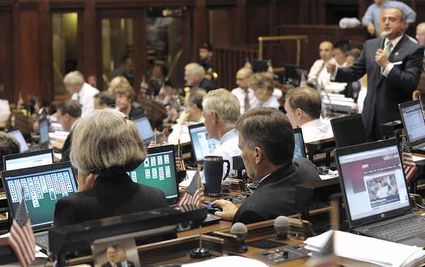First ever 'National Solitaire Day' celebrated on May 22
May 23, 2018

The photograph is real, although it has erroneously been attributed to a number of different legislative bodies, from the U.S. Congress to a variety of state legislatures. The picture was actually snapped in the Connecticut House of Representatives on 31 August 2009 by photographer Jessica Hill, while Rep. Larry Cafero was delivering a lengthy speech on the state budget. The photo was captioned by the Associated Press as follows: (AP Photo/Jessica Hill) A game of solitaire may calm the frazzled but it can also cause a hubbub. This 2009 photo by photographer Jessica Hill taken in the Connecticut House of Representatives during a floor debate on the state budget, precipitated a lot of outrage from the public in Connecticut as well as around the country. One writer called computer solitaire the "cockroach of games" because of its highly addictive nature and adaptability to any electronic platform.
Sorry I wasn't able to alert readers beforehand about this big news item. I only was aware of it when my wife shared a recent post from Microsoft sharing the good news. For those of you who may have spent the last thirty years on another planet or do not regularly use a computer or smart phone, this new national day honors solitaire played on a variety of electronic device. It was 28 years ago that Microsoft first added solitaire to 3.0 Windows.
When I read the announcement about yet another "national day of something" I had two questions. Why is Solitaire such a big deal that it needs its own national day and how is a "national day of something" created? Here's part of what I found out.
A short history of solitaire and the run up to National Solitaire Day
Solitaire, as the name suggests, is a game played by one player. It uses a regular deck of 52 cards and the goal is to end up with four stacks of cards in low to high order by suit. Game historians say the game, not too many years ago called Klondike, has been around for some 200 years. Back in the day the game, interestingly, was called "patience" suggesting that players who played it were actually improving their own sense of patience.
Fast forward to May 22, 1990, when Microsoft included a game of solitaire with its Microsoft 3.0 Windows version. The game, per old-timers in the know at Microsoft, wasn't included just for fun. It was added to "help teach computer users how to use a mouse" and "to soothe people intimidated by the operating system." Whether the game soothed users or taught them to use the mouse, it definitely went viral.
Readers have likely seen the estimates of how many man hours are wasted playing solitaire-it varies from the millions to the billions. Photos of or rumors of legislators playing solitaire on the their desktop computers during major debates have fomented torrents of outrage via mail and social media. Major corporations, Sears and Coca-Cola as examples, remove solitaire games from their company devices, leaving employees only their own personal phones to play the game at work. There was a famous case in New York City where the mayor saw a solitaire game idling on an assistant's workstation and publicly fired the unfortunate father of three.
But it's not all doom and gloom about the results of computer users playing solitaire. One blogger about computers noted that "playing solitaire is like white noise for the mind." After playing a few games of solitaire a person may be refocused, relaxed and able to tackle new tasks feeling refreshed. Some researchers in Europe studied two groups of solitaire players-residents in a nursing home and employees at an insurance company. In both cases they found "the test subjects' cognitive skills and general sense of wellbeing ranked statistically higher after playing computer solitaire."
So, 28 years after its first introduction to the public, solitaire is still alive and well. Likely a younger generation is drawn to more complicated electronic games, but solitaire is still the old standby for those of us who remember when desktops first hit the work place. And now solitaire now has its own national day we can celebrate. And that brings me to the second question...
Want to create your own
"National day for something?"
Alert readers might have noticed that virtually every day, every week and every month of the year has some designation for something we should be aware of, fight against or celebrate. Turns out it's not really all that hard to get your own national day, week, or month created.
First, though, realize a national day like the recently created National Solitaire Day has no official standing. It's not a day the banks and post offices close. There will likely be no public parades or school holidays. Those sorts of official days require legislative action by some level of government. What most of these national run of the mill days turn out to be, in reality, are not very subtle attempts to market some idea or product.
One of the major players in the creation of a national day is National Day Calendar (it's trademarked but that little icon won't print in the paper). Turns out the company that manages a large portion of the creation of all those national days and keeps the public informed about what national day is currently being celebrated is in "historic downtown Mandan, North Dakota." I would never have guessed that location in a million years.
The business may be in a obscure part of the world, but it has a major presence on the internet and, not surprisingly, you can order your national day online. Part of the package includes a press release announcing your day, annual inclusion of your national day on the official National Day Calendar website, Facebook and Twitter. You will receive, suitable for display, a 20 by 30 inch certificate declaring your day and a media alert goes out to 20,000 broadcasters, talk show hosts and newspapers. Thankfully I'm not on the list to receive those announcements at the "Journal."
Apparently Microsoft went through this process to get National Solitaire Day created. It's probably the cheapest advertising campaign they've launched in the past 30 years. And it will keep on every year and writers 50 years from now will be starting news stories with "Today marks the 50th anniversary of Microsoft's introduction of solitaire with its Windows 3.0 package." Kids will be asking grandparents, "Do you remember this ancient game? Did you really play it? What was it like? Wow, you must be really old." You get my drift.
Now the bad news if you already had a new national day in mind. This disclaimer is at the end of National Day Calendar's website where one would normally begin the process to create a new national day: "DUE TO A SUBSTANTIAL BACKLOG, WE ARE ONLY ACCEPTING APPLICATIONS FROM COMPANIES AND ORGANIZATIONS AT THIS TIME. Thank you." Hold that thought, maybe the backlog of national day ideas will be over soon.







